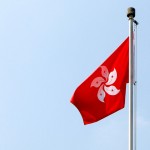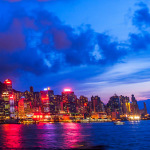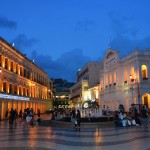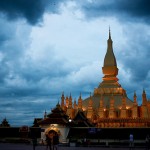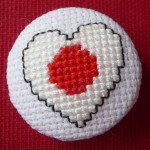Hong Kong public holidays are a mix of Buddhist, Christian and traditional Chinese celebrations, so these days offer a glimpse of Hong Kong’s heritage and culture in one snapshot. Since visitors are likely to belong to any one of these religious denominations, they can participate in any of Hong Kong festivals to make them feel part of the city, however briefly.
The holidays in Hong Kong are a magical time for both locals and visitors. Visitors who are planning to travel to Hong Kong should make it a point to try and come during a holiday to add more precious memories and unique experiences to their vacation. To ensure your vacation is exactly what you want, try 2014 China tours package by thechinatravelcompany.com for vacation packages that fit any traveler.
Hong Kong observes compensatory holidays. For example, if the actual holiday is on a weekend, then the next working day is a holiday. (The Chinese New Year is only until February 2 but since that day is a Sunday, Monday is a compensatory holiday.)
Below is the Hong Kong public holiday schedule 2014 as confirmed by the Hong Kong Government through the General Holidays Ordinance.
New Year’s Day – Wednesday, 1 January 2014
As with the rest of the international community, Hong Kong marks the first day of the first month of the Gregorian calendar.
Lunar New Year – Friday to Monday, 31 January – 3 February 2014
The Chinese New Year marks the arrival of spring according to the lunar calendar. Hong Kong celebrates this major event by incorporating ancient rituals and modern twists on the tradition. The festivities last for 14 days, with the final three days as public holidays. Spring means blossoms, and Hong Kong blooms on these days with its lush and colorful flower markets. The city is also filled with the sweet smell of incense as thousands of joss sticks are lit in temples around the city. Hong Kong lights up with world-renowned night parades and extravagant fireworks, and pulses with the beat of the Dragon Dance, among the many other events that fill up the New Year calendar.
Ching Ming Festival – Saturday, 5 April 2014
This is the tomb sweeping day in spring (the fall version is Chung Yeung festival). Families go to the cemeteries to clean their ancestors’ burial grounds and offer foods and prayers. In keeping with the ancient tradition, contemporary celebrations are centered around burning of paper goods that represent worldly conveniences (television, cellphones and the like) so the ancestors may have a better life in the other world.
Good Friday – Friday, 18 April 2014
Hong Kong has a sizable Christian and Catholic population (particularly because of the thousands of Filipinos who have found work here), so Good Friday processions bearing the image of the dead Christ can be seen around Kowloon where the Stations of the Cross are set up.
The Day After Good Friday – Saturday, 19 April 2014
Christians in Hong Kong, especially the Catholic, contemplate on the death of Jesus Christ and observe fasting on this day, called Black Saturday in Catholic circles.
Easter Monday – Monday, 21 April 2014
Hong Kong Christians commemorate the day after Jesus Christ rose from the dead with events pertaining to the Easter egg. Egg painting and races are held on this day (instead of Sunday which is the prevailing practice in the West).
Labour Day – Thursday, 1 May 2014
Hong Kong honors the achievements and accomplishments of workers and laborers on this day, in keeping with Labor Day practices of the international community.
The Birthday of Buddha – Tuesday, 6 May 2014
Hong Kong Buddhists celebrate the birth of their deity by sprinkling water on the statues and images of Buddha.
Tuen Ng Festival – Monday, 2 June 2014
The fifth day of the fifth lunar month is celebrated as the Duanwu Festival to commemorate the people’s attempt to rescue Chu Yuan, the Father of Chinese Poetry, from drowning. They raced in boats to get him to safety and threw cooked rice wrapped in bamboo leaves to entice the fish to eat those instead of the drowning poet. To this day, dragon boat racing is the highlight of the festivities, and in keeping with the tradition, people eat ‘zongzi’ or rice dumplings and drink nutritious concoctions on this day.
Hong Kong Kong Special Administrative Region Establishment Day – Tuesday, 1 July 2014
On this day in 1997, Hong Kong was handed over from its British colonizers to its original owners. China’s president Hu Jintao has, over the years, led the ceremonies participated by thousands of flag-waving Hong Kong citizens. This is also an opportunity for dissatisfied citizens to show their dissent towards China’s reluctance to give Hong Kong full autonomy so there are pockets of street rallies occurring on this day.
The Day After the Chinese Mid-Autumn Festival 2013 – Tuesday, 9 September 2014
After the Spring festival, the Mid-Autumn (harvest) festival (September 6-8, 2014) is the second most important festival in Chinese territories. Contemporary celebrations in Hong Kong are centered around the preparation and consumption of moon cakes, named after the time of the year when the moon is said to be brightest. Families gather together and watch the roundest moon of the year or stroll along Victoria Park to watch giant lanterns adorn and light up the city.
National Day – Wednesday, 1 October 2014
The founding of the People’s Republic of China is celebrated on this day. On this day in 1949, Mao Zedong read a declaration of the founding of the republic at 3PM in Tiananmen Square in front of 300,000 people. The National Day culminates on this day, but the celebrations are actually week-long. As the Chinese economy grew, workers are given time off to visit their families and to allow them to travel. As the festivities close, much-photographed and extravagant fireworks display goes up in Victoria Harbour.
Chung Yeung Festival – Thursday, 2 October 2014
Ancestor worship is an age-old tradition in China. On this day, families sweep the graves of their departed (similar to the spring grave-sweeping festival Ching Ming) and hold picnic outdoors, particularly in high places. This outdoor expedition was rooted on the legend of a man who lived during the Han dynasty when he was told by a seer to leave his town and seek high ground. When he and his family returned, they discovered his entire village was slaughtered, and they alone were spared. Since this day happens on the ninth day of the ninth lunar month, this festival is also called the Double Ninth.
Christmas Day – Thursday, 25 December 2014
Hong Kong has a sizable Christian population, so Christmas tradition is colorfully celebrated here as it is in the West.
Boxing Day – Friday, 26 December 2014
Hong Kong was a British colony before its handover to China. In Britain as in Hong Kong, gifts are ‘boxed’ on the first weekday after Christmas, hence the name of the holiday.
Explore the rest of the world
More from my site
Article by Chris
Chris had a passion to contribute to society especially to fellow travelers like himself. He also had a passion for Southeast Asia and frequently visited. While brainstorming ideas, he decided that a travel blog dedicated to his favorite countries, Thailand and Singapore, could be more beneficial than any guidebook. Only one year later did the blog’s success bring in more writers, more countries, and more readers.
- Google+ |
- More Posts (327)
Help others get the information they need by liking or sharing our page!
Follow @followloveblab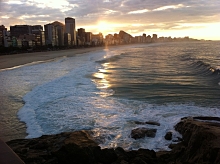 Enjoy one of the world’s most famous beaches
Enjoy one of the world’s most famous beaches